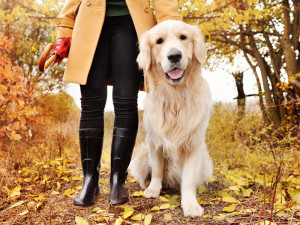Noise Sensitivity and Pain in Dogs
Research finds why dogs may suddenly become super sensitive to sounds.

share article
Turns out, your dog’s fear of fireworks and other loud sounds might also be related to the fact that their noise sensitivity is actually painful for them. A 2018 studyopens in a new tab about noise sensitivities in dogs gives us information that could improve the quality of life and well-being of a lot of dogs. The research suggests that pain can be a cause of new noise sensitivities, especially in older dogs.
Signs of Noise Sensitivity in Dogs
Some common signs of a dog’s sensitivity include cringing, trembling or retreating, but pet parents may be less able to identify signs of fear or anxiety when behaviors are more subtle. For example, dogs could pant, lick their lips, turn their head away or even stiffen their body. Sometimes their ears will turn back, and their head will lower below their shoulders. “We know that there are a lot of dogs that have noise sensitivities, but we underestimate their fearfulness to noise we consider normal because many dog owners can’t read body language,” says Emma Grigg, a research associate and lecturer at the UC Davis School of Veterinary Medicine.
“Dogs use body language much more than vocalizing and we need to be aware of that,” said Grigg. “We feed them, house them, love them and we have a caretaker obligation to respond better to their anxiety.”
Researching Noise Sensitivity in Dogs
The study compares two groups of dogs who both had sound sensitivities of various kinds. Dogs in the study all had fearful responses to sounds such as cars, planes, gunshots, motorcycles, fireworks, or thunderstorms. One group of dogs had also been diagnosed with a pain condition, while the other group contained dogs who were apparently free of such pain. (It’s hard to know for sure that a dog is pain-free, but these dogs had been evaluated and not found to be in pain.)
The two groups of dogs were generally similar in age, spay/neuter status, and temperament and did not vary substantially by breed. All were referred by other veterinarians to the specialty clinic where the research was conducted.
There were some really interesting differences between the two groups of dogs:
The dogs in pain had a later onset (nearly four years) of reactivity to noise.
Noise Sensitivity and Pain in Older Dogs
Researchers hypothesize that a dog startling in response to loud sounds may exacerbate pain. The resulting muscle tension or sudden movement may aggravate tender areas of the body, therefore creating an association between loud noises and pain, which could lead to the development of a fear of such sounds. They reasonably assume that pain is more likely to develop as dogs age.
It has long been known that when older dogs suddenly become aggressive, especially to other dogs, that pain may be the cause. Chasing, wrestling, and other behaviors common during play can increase pain in a dog with an injury or other physical issue, causing the dog to avoid such behavior and react negatively to dogs attempting to initiate play.
In the early years of my work with dogs with serious behavioral issues, I observed that many older dogs became thunderstorm-phobic or developed noise sensitivities that seemed out of character, and I wished that I knew why. I wondered if changes in the amygdala or other parts of the brain associated with fear could be a factor. The idea that pain can play a role in developing new fears makes sense, and that is more likely to happen to older dogs because they are more likely to have physical issues that cause pain. We have long known that the sudden onset of aggression and other behavioral issues is often a clue that pain is a factor, especially in older dogs.
Treating the Source
All of the dogs who were in pain except one improved substantially with treatment, confirming the researchers’ assertions that prognosis is excellent once the role of pain is identified and the case managed accordingly. (The pet parent of the one dog who did not improve chose not to use analgesics to alleviate the dog’s pain.) Once the pain is managed, it is still often necessary to use behavioral techniques to help dogs overcome the learned associations with loud noises.
The recommendations based on the work are:
Older dogs who become noise sensitive should be routinely assessed for pain
Analgesics or other pain management strategies should be considered.
Hopefully, the insights in this work will encourage practitioners to explore pain as a possible culprit in older dogs who develop a fear of loud noises. The more we understand dog behavior — dogs in general as well as each dog as an individual — the better we can care for these wonderful creatures who share our lives and our hearts.

Karen B. London, PhD, CAAB, CPDT-KA
Karen B. London, Ph.D., is a Certified Applied Animal Behaviorist and Certified Professional Dog Trainer who specializes in working with dogs with serious behavioral issues, including aggression, and has also trained other animals including cats, birds, snakes, and insects. She writes the animal column for the Arizona Daily Sun and is an Adjunct Professor in the Department of Biological Sciences at Northern Arizona University. She is the author of six books about training and behavior, including her most recent, Treat Everyone Like a Dog: How a Dog Trainer’s World View Can Improve Your Lifeopens in a new tab.
Related articles
- opens in a new tab
Does Your Dog Need Anti-Anxiety Meds?
How to cope with dog anxiety—from training to medication.
![Pet parent comforting anxious dog by holding their paw]() opens in a new tab
opens in a new tabHow to Help an Anxious Dog
Easy ways to calm your pup’s nerves.
![A dog looking timid in his bed]() opens in a new tab
opens in a new tabHow to Help Thunder-Phobic Dogs
Tips for comforting your pup when the storm is too loud for your pup’s comfort.
![Pet parent comforting anxious dog by holding their paw]() opens in a new tab
opens in a new tabHow to Help an Anxious Dog
Easy ways to calm your pup’s nerves.
![senior dog with arthritis happily sitting on the grass]() opens in a new tab
opens in a new tabCan CBD Oil Help Relieve Pain for Dogs With Arthritis?
Take a close look at the role CBD oil may play in a veterinarian-approved treatment plan for osteoarthritis.
![Close-up of a Merle coated Greyhound dog laying in the lap of their pet parent on the bed]() opens in a new tab
opens in a new tabHow to Give Relief to Your Dog With a Chronic Condition
What are the best ways to manage a dog’s pain?








